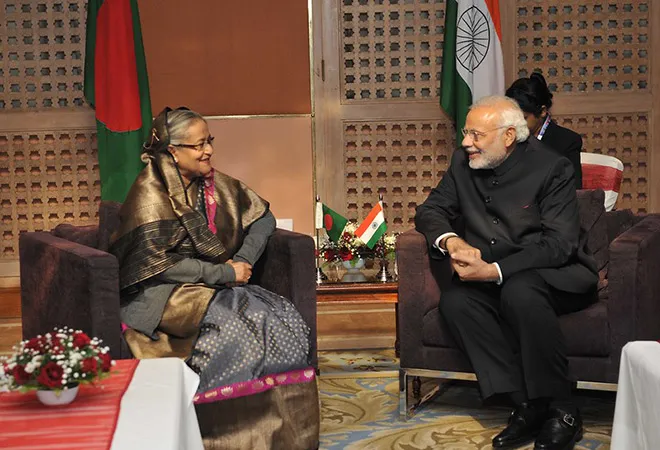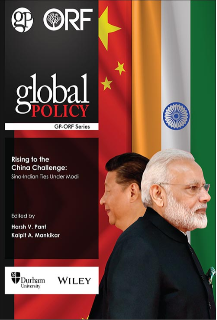
India and Bangladesh share a warm and friendly tie and regarded as a textbook example of a neighbourly relationship. Recently, however, claims are made about reduction of the warmth between the two countries. The core to such an assumption has been a report published in a popular Indian English daily which quoted an article in a Bengali daily of Bangladesh, making a claim that Prime Minister Sheikh Hasina not giving time to Indian envoy in the last four months. The report raised eyebrows in India because the authorities in Bangladesh usually have been prompt in accommodating such request by Indian envoy earlier. However, before attaining any conclusion about the future of the relationship it will be worthwhile to closely analyse the development in the bilateral relationship recently to verify the validity of the media’s claim.
Notably, Bangladesh foreign ministry (MOFA) refuted the claims made in the media. According to Bangladesh foreign ministry there is no question of not responding to the Indian High commissioner’s meeting request. Further, the ministry informed due to outbreak of Covid-19 pandemic Prime Minister Sheikh Hasina is maintaining social distancing and is not meeting any foreigners. In the last few months Prime Minister Sheikh Hasina has not met any foreigners then why such hue and cry were made about the meeting with Indian envoy. Also, the matter of getting an appointment with prime minister depends on the request made by any foreign mission. Indian High Commission has not made such meeting request in the period mentioned in the report. Indian High Commission has only sent a letter seeking an appointment for meeting on the 22 July.
In the last few months Prime Minister Sheikh Hasina has not met any foreigners then why such hue and cry were made about the meeting with Indian envoy.
The incident has left a feeling of resentment in Bangladesh and questions are been raised about Indian media’s motivation behind such a report. In Bangladesh, Indian media is closely observed, especially, any mention about the country or bilateral ties between the neighbours. A positive mention about the country in the Indian media results in a feeling of joy and negative mention evokes public displeasure, which often gives leeway to some vested quarters to encourage anti-India rhetoric. The incident has shed light on the need for the media to be conscious of these complexities and adopt a more nuanced approach while reporting about the bilateral relationship.
A prominent reason for assuming deterioration of the bilateral ties has been the phone call between Prime Minister Sheikh Hasina and Pakistani Prime Minister Imran Khan in July this year. For a long time, Bangladesh relationship Pakistan was not warm, especially when Sheikh Hasina government initiated a trial of the 1971 War criminals after her victory in 2009 election. This recent phone call between the two leaders was described by Pakistani media as rebooting of the ties between the two countries. Indian media became wary of this development and it was described as signalling of Bangladesh distancing its ties with India, a country which was its major partner in the neighbourhood. In 2016, Bangladesh was one of the first countries to pull out of the SAARC summit after India declined to participate on the ground of harbouring terrorism across the border. According to Indian media, the country’s initiation of National Registration of Citizenship and Citizen Amendment Act has ignited popular resentment in Bangladesh and the move is assertion of its displeasure about India.
This recent phone call between the two leaders was described by Pakistani media as rebooting of the ties between the two countries.
Recently, Bangladesh Foreign Minister observed that India and Bangladesh relationship has been rock solid and the past few years has been golden years for the bilateral relationship. Explaining the reason behind the phone call between Prime Minister Sheikh Hasina and Imran Khan, the Minister observed that Bangladesh follows a principle of friendship with all and malice with none. It was this policy that led Prime Minister Hasina went forward with the call.
Does this phone call change the dynamics of Bangladesh’s relationship with Pakistan? The answer lies in the two separate press release issued by the two governments. The press release issued by Pakistan claimed that the two sides along with Covid-19 pandemic situation in Bangladesh discussed issues regarding Kashmir and SAARC. The press release issued by Bangladesh government, however, completely overlooked the issue of SAARC and Kashmir and mentioned that the leaders exchanged courtesy and talked about the efforts in tackling Covid-19 pandemic and flood situation in Bangladesh. Besides, Bangladesh claimed that for any meaningful relationship with Pakistan the country should first apologise for the atrocities in 1971. Until now the hardly been any comment has been seen from Pakistan on this aspect. These two instances reflect the presence of the undercurrent between the two countries.
The feeling in Bangladesh is that the relationship India and Bangladesh share a unique bond ingrained in blood and it cannot be compared with any other country.
Also, people of Bangladesh are expressing displeasure over the repeated comparison of the bilateral relationship (India-Bangladesh) with that of its relations with China in the Indian media. The feeling in Bangladesh is that the relationship India and Bangladesh share a unique bond ingrained in blood and it cannot be compared with any other country. Moreover, Prime Minister Sheikh Hasina has been careful in balancing her country’s relationship with both China and India and she skilfully explained the differences between the two countries. During her visit to China in July 2019, she observed that Bangladesh’s relationship with India is organic that goes beyond a few billion while China is a partner in mega projects and economic engagement. The statement distinctly showcases Bangladesh’s definition of its relationship with the two Asian powers (China-India).
Again, analysis of the recent developments in the bilateral relationship suggests significant growth, hence authenticity about the prophecy on deterioration of the relationship is gaining suspicion. Contrarily, the cooperation between the two countries has deepened in areas of tackling disasters like the Covid-19 pandemic and connectivity. Bangladesh has been a major supporter of Prime Minister Modi’s call for a regional emergency fund for fighting Covid-19 and declared to contribute $1.5 million to the fund in March 2020. India also provided medical aid to Bangladesh to tackle medical assistance for dealing with Covid-19 pandemic. Besides, railway connectivity got a major boost as freight services were increased in past few months. Another important development of the period has been India providing 10 locomotives to the railways in Bangladesh as grant in aid because it needed the locomotives to run its services, since most of the existing ones have crossed their service life and the new engine order is likely to take some time to arrive from the USA. Again, the maritime connectivity was enhanced as a trial for the transhipment to India’s Northeast through Chittagong and was completed in July, a gesture considered could have severe political risks to the Sheikh Hasina government. The inland waterways connectivity between India and Bangladesh has also been strengthened. In May, the two countries signed an addendum to the protocol on inland water trade and transit and added two new routes and five port of call. These occurrences are reflective of the persistence of goodwill between the two countries.
The inland waterways connectivity between India and Bangladesh has also been strengthened.
Also, the cosy relationship between the countries could be witnessed from the interactions amongst the leaders of the two countries. In July, India External Affairs minister and Bangladeshi Foreign Minister met over a video conference where the two ministers were appreciative of the bilateral relationship. Besides, India high Commissioner met Abdul Quader, Prime Minister Shiekh Hasina’s number two in the party. The recent progress attained in the relationship would not have been possible without a positive understanding between the two countries.
Sustaining India and Bangladesh relationship will require support from all quarters. Recognising its uniqueness while analysing the relationship will contribute immensely in strengthening the bond between the two countries.
The views expressed above belong to the author(s). ORF research and analyses now available on Telegram! Click here to access our curated content — blogs, longforms and interviews.




 PREV
PREV


